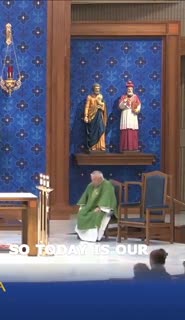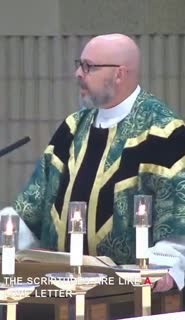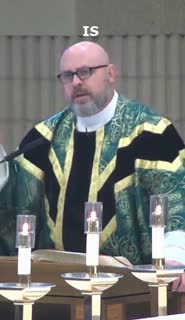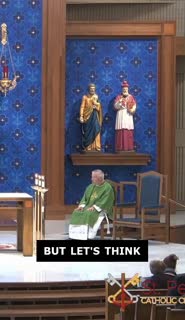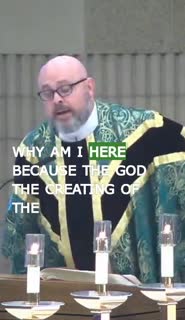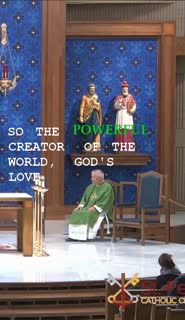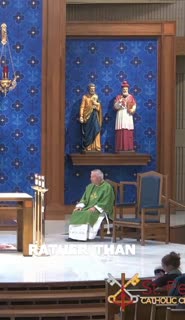Embracing Creation: Understanding Our Divine Purpose
Summary
In the name of the Father, and of the Son, and of the Holy Spirit, we gather to explore the profound mystery of creation and our place within it. Today, we delve into the Kerygma, the great proclamation of the early church, focusing on the question: Why is there something rather than nothing? The answer lies in the concept of being "created." This week, we seek the grace of wonder and trust as we meditate on this aspect of the Kerygma.
Genesis, particularly chapters 1 through 11, provides the foundation of creation, not as a scientific account but as inspired poetry. This poetic narrative invites us to explore the deeper truths of existence, much like a love letter from God. Unlike the chaotic creation myths of ancient Near Eastern civilizations, Genesis presents a God who creates with purpose and order, speaking light into existence without conflict. This narrative reveals a God who is not only powerful but also deeply personal, creating humanity as the crown of creation, made in His image and likeness.
We are endowed with the ability to know truth and choose good, experiencing true freedom. This freedom is not the liberty to do as we please but the capacity to love and be loved, reflecting the divine nature. Our understanding of God is often too limited, akin to the "puny god" in the Marvel movies. Yet, the grandeur of creation, from the vastness of the universe to the intricacies of life, points to a God of unimaginable greatness.
The universe, with its billions of galaxies and stars, was created to draw us into wonder and awe. It answers the fundamental questions of our existence: Why am I here? Where am I going? How do I get there? We are here because God willed our existence, loved into being at this moment. Our destination is to share in God's divine life, a life of love. We journey there through love, responding to God's love and loving others.
Despite our fears, we are reminded that God sees us individually, knows us by name, and cares for us deeply. We are called to trust in this loving Creator, casting our cares upon Him. The answer to why we exist is love—God's love for us, which calls us into a relationship with Him. This week, let us pray for the grace of wonder and awe at God's creation and trust in our good Father who cares for us.
Key Takeaways
- The Nature of Creation: Genesis is not a scientific account but inspired poetry that reveals deeper truths about existence. It invites us to see creation as a love letter from God, emphasizing the purpose and order in His creative act. This perspective helps us understand the profound love and intention behind our existence. [20:26]
- Humanity as the Crown of Creation: We are created in God's image, endowed with the ability to know truth and choose good. This freedom is not about doing as we please but about loving and being loved, reflecting the divine nature. Our true freedom lies in choosing what is good, right, and holy. [24:22]
- The Grandeur of God: Our understanding of God is often limited, but the vastness of the universe points to His unimaginable greatness. The universe, with its billions of galaxies and stars, was created to draw us into wonder and awe, reminding us of God's majesty and power. [26:47]
- Purpose and Destiny: We exist because God willed our existence, loved into being at this moment. Our destiny is to share in God's divine life, a life of love. We journey there through love, responding to God's love and loving others, fulfilling the greatest commandment. [29:50]
- Trust in God's Care: Despite our fears, God sees us individually, knows us by name, and cares for us deeply. We are called to trust in this loving Creator, casting our cares upon Him. The answer to why we exist is love—God's love for us, which calls us into a relationship with Him. [31:09]
Youtube Chapters
[0:00] - Welcome
[10:53] - Opening Prayer
[20:26] - Understanding Genesis
[24:22] - Humanity's Unique Role
[26:47] - The Grandeur of God
[29:50] - Purpose and Destiny
[31:09] - Trust in God's Care
[35:22] - Prayers of the Faithful
[39:34] - Eucharistic Prayer
[41:47] - The Mystery of Faith
[44:43] - Communion Rite
[46:22] - The Lord's Prayer
[48:09] - Invitation to Communion
[59:30] - Closing Prayer and Blessing
Study Guide
### Bible Study Discussion Guide
#### Bible Reading
1. Genesis 1:1-31 - The Creation Story
2. 1 John 4:7-8 - God is Love
3. 1 Peter 5:7 - Cast all your anxiety on Him because He cares for you
#### Observation Questions
1. How does Genesis describe the process of creation, and what is unique about God's method of creation compared to other ancient Near Eastern myths? [20:26]
2. What does it mean to be created in God's image and likeness according to the sermon? [24:22]
3. How does the sermon illustrate the grandeur of God using the universe and its vastness? [26:47]
4. What are the three fundamental questions of existence mentioned in the sermon, and how does creation answer them? [29:50]
#### Interpretation Questions
1. In what ways does the poetic nature of Genesis help us understand the deeper truths of existence beyond scientific explanations? [20:26]
2. How does the concept of being created in God's image influence our understanding of freedom and responsibility? [24:22]
3. What does the sermon suggest about our perception of God’s greatness, and how does this perception affect our relationship with Him? [26:47]
4. How does the sermon explain the purpose and destiny of humanity in relation to God's divine life? [29:50]
#### Application Questions
1. Reflect on the idea of creation as a love letter from God. How does this perspective change the way you view the world around you? [20:26]
2. Consider your understanding of freedom. How can you align your choices more closely with the concept of true freedom as the capacity to love and be loved? [24:22]
3. The sermon describes God as unimaginably great. How can you cultivate a sense of wonder and awe in your daily life to better appreciate His grandeur? [26:47]
4. Think about the three fundamental questions of existence. How do you personally answer these questions, and how does your faith inform your answers? [29:50]
5. The sermon emphasizes trusting in God's care. What specific fears or anxieties can you cast upon God this week, and how can you practice trusting Him more deeply? [31:09]
6. How can you actively respond to God's love by loving others in your community this week? What practical steps can you take to fulfill the greatest commandment? [29:50]
7. Reflect on the idea that God knows you by name and cares for you deeply. How does this truth impact your sense of identity and purpose? [31:09]
Devotional
Day 1: Creation as a Divine Love Letter
The opening chapters of Genesis are not meant to be read as a scientific account but as inspired poetry that reveals deeper truths about our existence. This poetic narrative invites us to see creation as a love letter from God, emphasizing the purpose and order in His creative act. Unlike the chaotic creation myths of ancient civilizations, Genesis presents a God who creates with intention and harmony, speaking light into existence without conflict. This perspective helps us understand the profound love and intention behind our existence, as we are invited to explore the deeper truths of being "created" and the grace of wonder and trust. [20:26]
"For thus says the Lord, who created the heavens (he is God!), who formed the earth and made it (he established it; he did not create it empty, he formed it to be inhabited!): 'I am the Lord, and there is no other.'" (Isaiah 45:18, ESV)
Reflection: How can you view the world around you as a love letter from God today, and what does that change about your perspective on your daily life?
Day 2: Freedom to Love and Be Loved
Humanity is created in God's image, endowed with the ability to know truth and choose good. This freedom is not about doing as we please but about loving and being loved, reflecting the divine nature. Our true freedom lies in choosing what is good, right, and holy. This understanding challenges us to see our freedom not as a license for self-indulgence but as a call to live in love and truth, aligning our choices with God's will. In this way, we reflect the divine nature and fulfill our purpose as the crown of creation. [24:22]
"For you were called to freedom, brothers. Only do not use your freedom as an opportunity for the flesh, but through love serve one another." (Galatians 5:13, ESV)
Reflection: In what ways can you use your freedom today to serve and love others, reflecting God's image in your actions?
Day 3: The Majesty of the Creator
Our understanding of God is often limited, but the vastness of the universe points to His unimaginable greatness. The universe, with its billions of galaxies and stars, was created to draw us into wonder and awe, reminding us of God's majesty and power. This grandeur invites us to expand our understanding of God beyond our limited perceptions, recognizing His infinite greatness and the depth of His love for us. As we contemplate the universe, we are called to a deeper sense of wonder and awe at the Creator who knows us by name and cares for us deeply. [26:47]
"Lift up your eyes on high and see: who created these? He who brings out their host by number, calling them all by name; by the greatness of his might, and because he is strong in power, not one is missing." (Isaiah 40:26, ESV)
Reflection: How can you cultivate a sense of wonder and awe in your daily life, recognizing the majesty of God in the world around you?
Day 4: Journeying Towards Divine Love
We exist because God willed our existence, loved into being at this moment. Our destiny is to share in God's divine life, a life of love. We journey there through love, responding to God's love and loving others, fulfilling the greatest commandment. This journey is not just about reaching a destination but about living a life of love and purpose, aligning our actions with God's will and embracing the call to love others as He loves us. As we reflect on our purpose and destiny, we are reminded of the profound love that calls us into a relationship with God and with one another. [29:50]
"And this is love, that we walk according to his commandments; this is the commandment, just as you have heard from the beginning, so that you should walk in it." (2 John 1:6, ESV)
Reflection: What is one practical way you can respond to God's love today by loving others in your community?
Day 5: Trusting in God's Loving Care
Despite our fears, God sees us individually, knows us by name, and cares for us deeply. We are called to trust in this loving Creator, casting our cares upon Him. The answer to why we exist is love—God's love for us, which calls us into a relationship with Him. This trust invites us to let go of our anxieties and fears, resting in the assurance of God's care and provision. As we trust in God's love, we are empowered to live with confidence and peace, knowing that we are held in the hands of a loving Father who desires the best for us. [31:09]
"Cast your burden on the Lord, and he will sustain you; he will never permit the righteous to be moved." (Psalm 55:22, ESV)
Reflection: What is one fear or worry you can entrust to God today, and how can you actively practice trusting Him with it?
Quotes
1. "So today is our second week of our homily series on the Kerygma, the great proclamation of the early church that is the story of what God has done for us. And so in this first one the question that we want to answer is why is there something rather than nothing, right? Why does anything at all exist? And so when we come to the conclusion of this we're gonna be able to sum this up in one word and we'll just call that word created." [10:53] (35 seconds)
2. "The scriptures are like a love letter from God. He's trying to help us not, he doesn't want us to, he's not trying to teach us how things came about in the beginning, but why they came about. That's the deeper and more important question." [20:26] (14 seconds)
3. "Because freedom is many times misunderstood in our world today. Oftentimes people think of freedom as the ability to do whatever I want, whenever I want to, right? But we know from our own experience that many times we choose the lower things of our nature. And many times we become addicted to them, right? Because that's not really free. And whenever we talk about freedom, it's the freedom to choose what is good and right and holy. It's the freedom, actually, to love and to be loved. Because that's what we've been created for." [24:22] (36 seconds)
4. "But let's think about, for a moment, the power and grandeur of God. I don't know if anybody has seen the Marvel movies. There's only 25 of them or something right now. But one of my favorite scenes in one of them was the Avengers, the first Avengers. So Loki is this god or demigod who's trying to attack and take over the Earth. And the Avengers are kind of forming at this time to try to stop them. And at this one scene, Loki gets knocked into Stark Tower." [26:47] (38 seconds)
5. "Why am I here? Because the God the creating of the universe this vast universe willed that you and I exist in this time in this moment, in this place. God willed your existence. He loved you in to this moment. You know, if we spend some time praying with that, it's amazing what that can do for our own hearts." [29:50] (24 seconds)
6. "So the powerful creator of the world, God's love of all things, right? This loving father who holds us in existence at every moment, he tells us in the scriptures over and over again, over 365 times, do not be afraid, right? But I know we all have fears. We all live with fears. Fears come up in our life all the time, but we don't have to believe them, right? Because we have a God who has chosen each one of us to be here." [31:09] (31 seconds)
7. "Why is there something rather than nothing what is the answer to that question why were we created right the answer is love because God thinks you and I are worth it God thinks you and I matter that's why we experience in this this one movement of the kerygma is we experience the goodness of creation and the goodness of the God who created us and who calls us into relationship with him." [35:22] (30 seconds)
